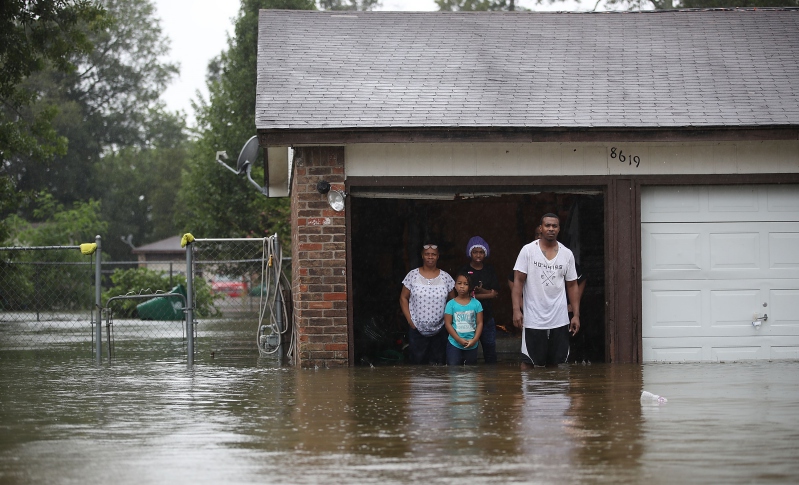
Federal regulators must strengthen flood risk disclosure and create policies to confront climate change.
In the United States, 14.6 million homes are at risk of flooding—how confident are you that your home is not one of them?
You might not know because only half of states require sellers to disclose the risk of flooding to homebuyers, even though the Federal Emergency Management Agency (FEMA) reports that flooding is the most common natural disaster in the country. Because of climate change, it will only become even more common.
Homeowners must know their properties are at risk, but state and federal governments should also craft policies to protect at-risk homeowners from both physical danger and financial ruin.
Without both better disclosure and financial support for potential buyers, homeowners take on huge risks. Flooding will cost U.S. homeowners as much as $20 billion this year—four times what flood damage cost homeowners in the 1980s, as adjusted for inflation. Florida homeowners alone are anticipated to spend $8 billion each year fixing the damage wrought by flooding, and experts expect those costs to rise due to the effects of climate change.
In addition to incurring financial costs, flooding events can harm an occupant’s mental well-being. Researchers in the United Kingdom studying flood victims found that many of them suffered from post-traumatic stress disorder (PTSD), anxiety, and depression, especially if they had been forced to vacate their homes, had already experienced a flooding event, or were in poor health when the flooding occurred.
Considering these harms, agencies can implement regulations that would make the housing process less opaque for buyers.
Advocacy groups and scholars increasingly call on federal regulators to close the risk information gap for consumers looking to buy property by creating stronger rules for flood risk disclosure.
The Natural Resources Defense Council (NRDC) recommends steps that the federal government could take to improve risk disclosure to homeowners. FEMA could guarantee homeowners a “right to know” about a property’s history of flooding and flood insurance coverage. FEMA could also prompt changes in state regulations by requiring states to adopt flood hazard disclosure requirements as a precondition of participation in the National Flood Insurance Program (NFIP)—a program managed by FEMA that provides affordable flood insurance to property owners.
Recently, though, the federal government’s role in flood risk disclosure has come under scrutiny. Investigative journalists have found that the U.S. Department of Housing and Urban Development (HUD)—which sells homes foreclosed upon because of the previous owner’s inability to pay a federally insured mortgage—disproportionately sells property located in flood-prone areas compared to all homes sold in the United States.
During such sales, HUD does not disclose flood risk to homebuyers until buyers have already made an offer on a house—despite the fact that FEMA maintains a database containing the relevant flood information that HUD would need to inform consumers about risks. The investigative journalists found that no federal regulation requires HUD to disclose flood risk, and a HUD spokesperson explained that doing so would go beyond the HUD’s role as a mortgage insurer.
Regardless of the federal government’s practice of disclosure, 74 percent of Americans support a federal law to require flood risk disclosures.
But effective disclosure practices will not be enough to ensure that homeowners are adequately prepared for flooding. A disproportionate number of people living in areas prone to flooding are poor, and low-income homeowners are more likely to suffer from the physical and financial costs of flooding.
Poorer Americans are more likely to live in high-risk housing because those houses are more affordable or because of racist housing policies that reserved safer properties for richer, white residents and pushed poorer, predominantly Black residents to flood-prone neighborhoods. Even worse, disclosure may not be enough to mitigate risks for residents who may not have an option to leave their neighborhoods. Some residents will not consider leaving because they have emotional ties to their communities.
Disclosure cannot help people who have nowhere else to go, and regulators must act to protect these consumers. The federal government should develop and expand progressive policies, including home buyouts, flood-resistant building requirements, and other consumer friendly policies that help homeowners in flood-prone areas. Buyout programs, for example, allow governments to purchase homes at a fair price and could give consumers a viable option for leaving flooded areas.
But so far, FEMA’s buyout programs have not met the ever-growing need for relocation caused by climate change. Instead, one advocate urges regulators to rethink their strategy for assisting flood victims and to move away from policies that address flooding on a case-by-case basis.
Regulators should replace these less effective policies with programs that are informed by long-term thinking, which means acknowledging that flooding will only become worse in the coming decades and that consumers are not equipped to handle the consequences without regulatory intervention. Increasingly, policymakers turn to “managed retreat” plans that coordinate the purposeful movement of people and their belongings out of areas that are vulnerable to flood.
But regulators should also be careful to preserve communities and cultures that fracture when people are forced to leave their homes. When governments pursue managed retreat policies, for example, policymakers need to include community members in the planning process.
Congress must pass legislation like the Green New Deal to mitigate climate change before it is too late. Until then, regulators should coordinate long-term policies that help consumers before the next climate event, not after.
Disclosure should be part of that strategy, but a holistic and equitable approach to mitigating flood risk should include government funding and support for marginalized people most affected by flooding.



